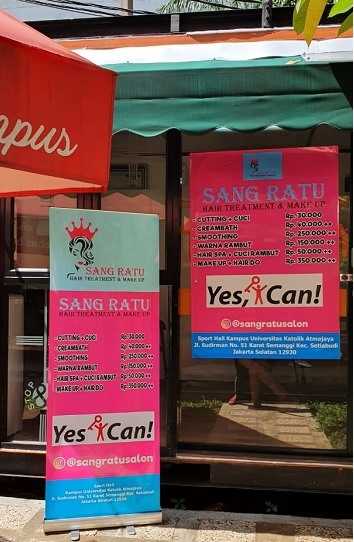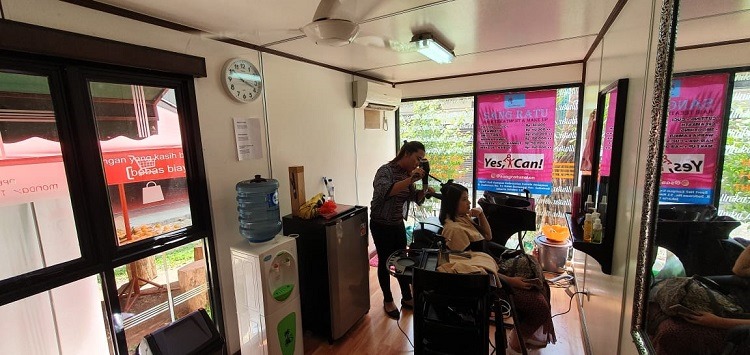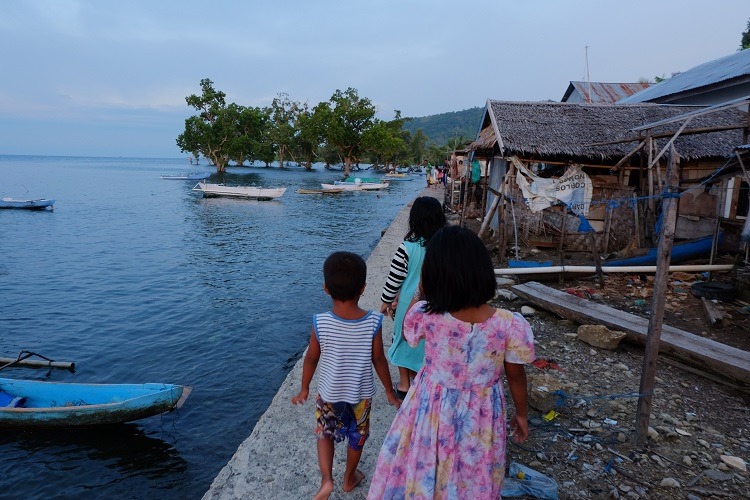Versi Bh. Indonesia
The pandemic calls for inclusive and holistic mental health care, delivered by all of us
Andrea Adhi, Marsha Habib and Widi Sari
There is growing recognition of the importance of mental health in Indonesia, and many improvements have been made to the country’s mental health care system over the past decade. Despite this, many challenges with respect to access and quality remain. Indonesia passed a mental health law in 2014, however, because no relevant regulations were issued afterward, this law has thus far only had a modest impact. The mental health system is, therefore, still in need of improvement.
Indonesia implemented its universal health care system (Jaminan Kesehatan Nasional or JKN) in 2014. As of September 2019 the system covered 221 million people. It includes psychological and psychiatric treatment and this has made mental health care services much more accessible, in particular for people of limited means.
The rules of the health system require people who seek treatment for mental health problems to first visit a community health centre, or puskesmas. If necessary, physicians working in these health centres provide a referral for more specialised treatment. Mental health awareness campaigns have grown in number and while this is notable progress, access to high-quality mental health care remains limited to privileged people. Proper mental health care is still a luxury for millions of children and other vulnerable groups in Indonesia, especially in rural areas.

The pandemic and the importance of inclusivity
The COVID-19 pandemic has had an adverse impact on the mental health of many Indonesians. The virus not only affects people’s physical health, but also their mental health. The United Nations (UN) reports that these immediate health impacts and the consequences of physical distancing have caused significant stress. The UN secretary-general, Antonio Guterres, describes the impact of COVID-19 as ‘grief at the loss of loved ones, shock at the loss of jobs, isolation, and restrictions on movement, difficult family dynamics, uncertainty and fear for the future’.
The effects are much more serious for children and vulnerable individuals, especially those with lower income, due to the added risk they are exposed to. For example, home-learning programs might be more stressful than attending school due to limited facilities for learning at home, especially if home life was precarious before the pandemic even started. For many other groups, the situation is even worse. The caregivers of many children are no longer able to provide care because of COVID-19. Homeless children face enormous difficulties both mentally and financially. The pandemic has increased risk for everybody, no matter who they are or where they come from.
The current pandemic calls for mental health inclusivity, especially in order to support and empower individuals from vulnerable groups. However, without knowing which groups are vulnerable and which mental health risks they face, it is impossible to provide the assistance they need. Moreover, we also know that access, quality and stigma are interdependent factors that play a role in the mental health care system.
At the onset of the pandemic, many people who had not previously been vulnerable became so. It is important that we first determine which groups are most vulnerable, as Indonesia’s social protection system does not always cover everybody who is in need. Even before the pandemic started, groups of vulnerable individuals were being overlooked. The pandemic will only exacerbate this problem.
Three of the most vulnerable groups in Indonesian society are children out of household care, elderly people and socially excluded people.
- Children out of household care
Children out of household care are often excluded from policy considerations and assistance programs. This group consists of homeless children and children in orphanages, correctional facilities and religious institutions. Recent data released by the Indonesian Ministry of Law and Human Rights indicates that 1660 children were detained in correctional facilities. Data from the Ministry of Religious Affairs indicates that 939,087 children live in pesantren (Islamic boarding schools). Additionally, the Ministry of Social Affairs has recorded that 102,482 children are institutionalised in 3575 panti (government- or community-owned orphanages, rehabilitation centres and similar institutions), and estimates that about 12,000 children are homeless or living on the street.
Children outside of family care are more likely to experience mental distress. In 2014, Center on Child Protection and Wellbeing at the University of Indonesia (Pusat Kajian dan Advokasi Perlindungan dan Kualitas Hidup Anak Universitas Indonesia or PUSKAPA) published a study revealing that 42 per cent of children in panti and 51 per cent of children in pesantren have experienced physical violence at least once during their residency. In addition, 32 per cent of children in pesantren felt desperate, 21 per cent felt anxious, and 18 per cent felt sad during the last month. With respect to children in correctional institutions, 31 per cent felt anxious, 25 per cent felt sad, and 10 per cent reported feeling desperate in the previous month. Across all institutions, 17 per cent reported feeling that they had no friends or anyone they could trust.
- Elderly people
The elderly are at the highest risk of succumbing to COVID-19, with a greater fatality rate for people aged 60 and older. Not only are the elderly susceptible to the disease itself, but its effects on their mental health are also particularly strong. Elderly people are prone to mental health issues due to stressors that are more common in later life, such as a significant loss in both physical and mental capacity, and a decline in functional ability. In Indonesia, an estimated 1.2 million individuals have dementia. A study conducted in Yogyakarta revealed that most elderly individuals as well as their caregivers lack knowledge of dementia and other mental health problems.
- Socially excluded people
This category includes sexual and religious minorities as well as those who do not hold legal identity documents such as an identity card or birth certificate. In Indonesia, transgender people often experience assault and discrimination. Recently, a transgender person was burnt to death by a group of men in Jakarta. These men were not charged by the police. In some parts of Indonesia, members of minority religious groups live in constant fear, which puts their mental health at risk. Frequently, they do not have legal identity documents because of discrimination, which prevents them from accessing government services and social support. The 2018 National Socioeconomic Survey (Survei Sosial Ekonomi Nasional or SUSENAS 2018) estimated that approximately 28 per cent of children under the age of five have no birth certificate. An Australia Indonesia Partnership for Justice study reported that children of parents who are not legally married experience great difficulties in getting a birth certificate. Meanwhile, having a birth certificate without one’s father’s name carries a strong negative stigma.
The big question
It is not very difficult to identify the social groups most at risk. But what can we do about their mental health? We know that some individuals are systematically denied their right to mental health care. We also know that, in the policy arena, mental health is still not considered of primary importance. Moreover, we know one thing for sure – we need to start somewhere.
We can start by making sure that mental health issues are not seen as being separate from other issues. Instead of continuously limiting our options, it is more helpful to focus on people who need help and to determine their needs. We do not even need to use the term ‘mental health’. If we continue to limit our options by focusing exclusively on mental health, we will miss the chance to collaborate effectively with other programs and initiatives that assist vulnerable people and that allow them to survive and thrive.
Helping with existing support programs for vulnerable groups will help us create more opportunities. For example, we already know that we do not have enough psychiatrists and clinical psychologists in Indonesia. There are only 987 psychiatrists in the whole country, which equals one psychiatrist for 250,000 individuals. And there are only 1143 clinical psychologists in Indonesia. This is why focusing on individual clinical interventions is not enough. We know that mental health is determined by various social, economic and physical factors that operate at different stages of life. This is why a holistic perspective on mental health is not only important in its own right but can result in effective interventions as well.
Consider, for example, Salon Sang Ratu, a beauty salon managed by and for transgender women. It is located at the Semanggi campus of Atma Jaya Catholic University of Indonesia in Jakarta. The salon is run by the Yes, I Can! program, a community empowerment program of Atma Jaya’s HIV/AIDS Research Centre (Pusat Penelitian HIV AIDS or PPH). It provides many more services than just styling hair and doing makeup. This initiative does not make reference to the term ‘mental health’ at all; however, it does provide a safe space for transgender women. They are not only are accepted here, they are also empowered to contribute to its operations, which benefits their mental health.
Collaborating with existing programs that empower vulnerable groups can help us mainstream mental health. Integrating mental health care in existing initiatives benefits everybody, but it especially benefits members of vulnerable groups because it improves their quality of life more drastically. Almost inevitably, programs that promote equality, inclusion, acceptance and social justice will have a positive impact on mental health.

Supporting mental health is always possible
The good news is that there are many, many opportunities to assist, even if we might not currently be participating in ongoing programs and initiatives. Kindness is always welcome and can be easily provided at any moment. We should be empathetic, and we should remember that just because someone looks happy and content it doesn’t necessarily mean they are doing well. We have to remind ourselves that we don’t always know what people are going through. It is therefore important to be kind and helpful.
This pandemic has devastated our mental health. We are only now beginning to see how it has put everyone at risk, regardless of who they are or where they come from. Many of us are experiencing anxiety, depression, hopelessness and frustration. For some, this can lead to even more serious conditions. The difference is our capacity to mitigate that risk. Being aware of our privileges, including, for many, our capability for maintaining our own mental health, is always important.
Improving mental health care is not just up to health care workers. Whatever we do for a living, we can all contribute to building more, and stronger, bridges to help create mental health care for all. Everybody has to do their part. We can never succeed alone. Deficiencies in Indonesia’s mental health care system already existed before the pandemic started, especially for members of vulnerable groups. The pandemic has stretched our mental health resources thinner than ever before. The gap has widened. We need to push harder for real change in Indonesia’s mental health care system. Adequate and accessible mental health care should become the new normal.
It is important that policy makers, researchers and practitioners regularly identify which groups are vulnerable to make sure that no one is left behind. In addition, we should collaborate with existing initiatives that target vulnerable groups. This is a crucial opportunity to build an integrated support system.
We realise that improving the mental health care system requires time, energy and determination. However, there is still a lot we can do on a daily basis to improve the mental health of individuals. Each of us can continue practicing kindness to ourselves and to each other. We need it now, more than ever.
Andrea Adhi (andrea@puskapa.org) is PUSKAPA’s lead for social inclusion and protection. Marsha Habib (marsha@puskapa.org) is PUSKAPA’s communication and relations manager. Widi Sari (widi.sari@puskapa.org) is PUSKAPA’s lead for research, monitoring and evaluation.
